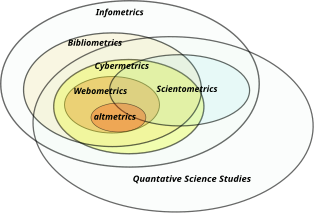
Information science is an academic field which is primarily concerned with analysis, collection, classification, manipulation, storage, retrieval, movement, dissemination, and protection of information. Practitioners within and outside the field study the application and the usage of knowledge in organizations in addition to the interaction between people, organizations, and any existing information systems with the aim of creating, replacing, improving, or understanding the information systems.

This page is a glossary of library and information science.
Music information retrieval (MIR) is the interdisciplinary science of retrieving information from music. Those involved in MIR may have a background in academic musicology, psychoacoustics, psychology, signal processing, informatics, machine learning, optical music recognition, computational intelligence or some combination of these.

OCLC, Inc., doing business as OCLC, is an American nonprofit cooperative organization "that provides shared technology services, original research, and community programs for its membership and the library community at large". It was founded in 1967 as the Ohio College Library Center, then became the Online Computer Library Center as it expanded. In 2017, the name was formally changed to OCLC, Inc. OCLC and thousands of its member libraries cooperatively produce and maintain WorldCat, the largest online public access catalog in the world. OCLC is funded mainly by the fees that libraries pay for the many different services it offers. OCLC also maintains the Dewey Decimal Classification system.
The Open Archives Initiative Protocol for Metadata Harvesting (OAI-PMH) is a protocol developed for harvesting metadata descriptions of records in an archive so that services can be built using metadata from many archives. An implementation of OAI-PMH must support representing metadata in Dublin Core, but may also support additional representations.
In information science, authority control is a process that organizes information, for example in library catalogs, by using a single, distinct spelling of a name (heading) or an identifier for each topic or concept. The word authority in authority control derives from the idea that the names of people, places, things, and concepts are authorized, i.e., they are established in one particular form. These one-of-a-kind headings or identifiers are applied consistently throughout catalogs which make use of the respective authority file, and are applied for other methods of organizing data such as linkages and cross references. Each controlled entry is described in an authority record in terms of its scope and usage, and this organization helps the library staff maintain the catalog and make it user-friendly for researchers.
Controlled vocabularies provide a way to organize knowledge for subsequent retrieval. They are used in subject indexing schemes, subject headings, thesauri, taxonomies and other knowledge organization systems. Controlled vocabulary schemes mandate the use of predefined, preferred terms that have been preselected by the designers of the schemes, in contrast to natural language vocabularies, which have no such restriction.
Michael Gorman is a British-born librarian, library scholar and editor/writer on library issues noted for his traditional views. During his tenure as president of the American Library Association (ALA), he was vocal in his opinions on a range of subjects, notably technology and education. He currently lives in the Chicago area with his wife, Anne Reuland, an academic administrator at Loyola University.

In library and information science, cataloging (US) or cataloguing (UK) is the process of creating metadata representing information resources, such as books, sound recordings, moving images, etc. Cataloging provides information such as author's names, titles, and subject terms that describe resources, typically through the creation of bibliographic records. The records serve as surrogates for the stored information resources. Since the 1970s these metadata are in machine-readable form and are indexed by information retrieval tools, such as bibliographic databases or search engines. While typically the cataloging process results in the production of library catalogs, it also produces other types of discovery tools for documents and collections.
The Master of Library and Information Science (MLIS), also referred to as the Master of Library and Information Studies, is the master's degree that is required for most professional librarian positions in the United States. The MLIS is a relatively recent degree; an older and still common degree designation for librarians to acquire is the Master of Library Science (MLS), or Master of Science in Library Science (MSLS) degree. According to the American Library Association (ALA), "The master’s degree in library and information studies is frequently referred to as the MLS; however, ALA-accredited degrees have various names such as Master of Information Studies, Master of Arts, Master of Librarianship, Master of Library and Information Studies, or Master of Science. The degree name is determined by the program. The [ALA] Committee for Accreditation evaluates programs based on their adherence to the Standards for Accreditation of Master's Programs in Library and Information Studies, not based on the name of the degree."
Bibliographic coupling, like co-citation, is a similarity measure that uses citation analysis to establish a similarity relationship between documents. Bibliographic coupling occurs when two works reference a common third work in their bibliographies. It is an indication that a probability exists that the two works treat a related subject matter.
Knowledge organization (KO), organization of knowledge, organization of information, or information organization, is an intellectual discipline concerned with activities such as document description, indexing, and classification that serve to provide systems of representation and order for knowledge and information objects. According to The Organization of Information by Joudrey and Taylor, information organization:
examines the activities carried out and tools used by people who work in places that accumulate information resources for the use of humankind, both immediately and for posterity. It discusses the processes that are in place to make resources findable, whether someone is searching for a single known item or is browsing through hundreds of resources just hoping to discover something useful. Information organization supports a myriad of information-seeking scenarios.
Music librarianship is the area of librarianship that pertains to music collections and their development, cataloging, preservation and maintenance, as well as reference issues connected with musical works and music literature. Music librarians often have degrees in both music and librarianship. Music librarians deal with standard librarianship duties such as cataloging and reference, which become more complicated when music scores and recordings are involved. Therefore, music librarians generally read music and have at least a basic understanding of both music theory and music history to aid in their duties.

Library and information science(s) or studies (LIS) is an interdisciplinary field of study that deals generally with organization, access, collection, and regulation of information, whether in physical or digital forms.

Metadata is "data that provides information about other data", but not the content of the data itself, such as the text of a message or the image itself. There are many distinct types of metadata, including:
Derek Austin was a British librarian and author.
The following outline is provided as an overview of and topical guide to information science:
Jack Mills was a British librarian and classification researcher, who worked for more than sixty years in the study, teaching, development and promotion of library classification and information retrieval, principally as a major figure in the British school of facet analysis which builds on the traditions of Henry E. Bliss and S.R. Ranganathan.
Pauline Atherton Cochrane is an American librarian and one of the most highly cited authors in the field of library and information sciences. She is considered a leading researcher in the campaign to redesign catalogues and indexes to provide improved online subject access in library and information services as well as "a leading teacher and theorist in cataloging, indexing, and information access."





